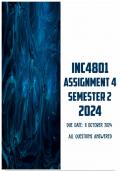, PLEASE USE THIS DOCUMENT AS A GUIDE TO ANSWER YOUR ASSIGNMENT
Please note that the author of this document will not responsibility for any plagiarizing you
commit.
1. Read the extract below and answer the questions that follow.
How inclusive classrooms foster empathy, skills, and success for all students
India Today Education Desk
New Delhi, UPDATED: Aug 24, 2024 15:43 IST
Inclusive education is emerging as a crucial element in creating equitable learning environments that
benefit all students, including those with and without disabilities. By fostering a sense of belonging
and respect for diversity, inclusive classrooms provide every student with the opportunity to succeed in
a supportive and safe environment. "An inclusive classroom creates a level playing field for all
students, respecting each student's background, learning style, and abilities," notes educational expert,
Praneet Mungali.
BUILDING MEANINGFUL RELATIONSHIPS AND EMPATHY
In India, the lack of formalised programmes in mainstream schools often hampers the integration of
students with diverse learning needs. However, inclusive settings allow students to build meaningful
relationships and learn to appreciate differences without bias. "These classrooms are not just about
academics; they provide a platform for students to connect emotionally," Mungali explains. This
environment is particularly beneficial for students with disabilities, who may struggle with social
skills, while also teaching their peers without disabilities empathy, patience, and effective
communication.
DEVELOPING ESSENTIALS LIFE SKILLS
Research shows that students in inclusive settings develop essential life skills, such as
problem-solving, adaptability, and self-management. These skills are crucial for personal and
academic success, as well as for future societal contributions. Yet, the success of inclusive education
largely hinges on teacher training. "Teachers are a paramount ingredient in the success of inclusive
education," says Mungali. Trained educators not only foster a safe and nurturing environment but also
help parents of children with special needs by addressing their concerns with sensitivity. While some
schools, such as Sanskriti School in Pune, have successfully implemented inclusive education by
employing special educators and adapting curricula, the journey toward widespread inclusivity is
ongoing. "Studies suggest that only 9% of disabled students complete secondary school," Mungali
points out, highlighting the significant challenges still faced by many, especially girls and children
with autism or cerebral palsy.
A nationwide effort is needed to make inclusive education a reality. This includes improving
infrastructure, enhancing teacher training, and fostering a culture of responsibility and trust. By
making these changes, all children — regardless of their abilities — can have access to high-quality,
inclusive education that promotes holistic development and prepares them for active participation in
their communities.
Source:
https://www.indiatoday.in/education-today/featurephilia/story/how-inclusive-classrooms-foster-empat
hy-skills-and-success-for-all-students-2587319-2024-08-24
, 1.1. Critically analyse the progress of implementation of inclusive education in India and any
other three countries using the themes below (Winter & O’Raw 2010).
1.1.1 Physical Features
Inclusive education aims to accommodate students with diverse needs, ensuring that all learners have
equitable access to learning environments. To evaluate the progress of inclusive education in India
and three other countries, the theme of "physical features" provides a critical lens through which we
can assess the infrastructural adaptations necessary to support inclusive education effectively.
Physical features are pivotal because they determine the accessibility of educational spaces,
resources, and facilities for students with disabilities. This section will critically analyze the physical
features influencing inclusive education in India, the United States, South Africa, and Finland,
considering their advancements, challenges, and the extent to which their educational settings
promote inclusivity.
India
In India, the movement toward inclusive education is still in its formative stages. Although the
country has made strides in legal and policy frameworks, physical infrastructure remains a
significant barrier. The Right of Children to Free and Compulsory Education Act (RTE) of 2009
mandates that schools should provide adequate infrastructure, including provisions for students with
disabilities. However, in practice, many schools still lack basic facilities such as ramps, accessible
toilets, and classrooms designed to accommodate children with diverse physical needs.
Schools in rural areas face particular challenges. Many buildings are not accessible, and the lack of
resources limits schools’ ability to retrofit older structures to meet accessibility standards. As a result,
students with disabilities often face difficulty in attending mainstream schools, particularly in rural
settings. Even in urban schools, there is a considerable gap between policy and practice. Although
some elite private schools like Sanskriti School in Pune have successfully implemented inclusive
education with adequate physical accommodations, these are exceptions rather than the norm. Many
government schools, which cater to a large portion of the student population, still lag in terms of
physical inclusivity.
The Samagra Shiksha Abhiyan (SSA), a government initiative, aims to provide funding to improve
school infrastructure, including making schools more accessible. However, the allocation and
utilization of these funds have been inconsistent across states, and infrastructural changes have been
slow to materialize. Additionally, while urban schools might implement some accessibility features,
the lack of adequate transportation for students with disabilities further hampers their access to
inclusive education.
United States
In contrast, the United States has a more established framework for inclusive education, particularly
concerning physical features. The Individuals with Disabilities Education Act (IDEA) and the
Americans with Disabilities Act (ADA) mandate that schools must provide accessible environments
for students with disabilities. This includes building features such as ramps, elevators, tactile paving,
and accessible restrooms, as well as assistive technology like braille readers, hearing aids, and
computer-assisted communication tools.
Most public schools in the U.S. are required to comply with these federal regulations, which are
strictly enforced. This has led to significant improvements in physical infrastructure across the
country. Schools are generally designed or retrofitted to accommodate the diverse needs of students,




